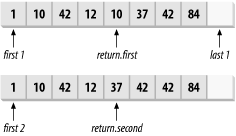Name
mismatch function template — Finds first position where two ranges differ
Synopsis
template<typename InIter1, typename InIter2>
pair<InIter1, InIter2>
mismatch(InIter1 first1, InIter1 last1, InIter2 first2);
template<typename InIter1, typename InIter2, typename BinaryPredicate>
pair<InIter1, InIter2>
mismatch(InIter1 first1, InIter1 last1, InIter2 first2,
BinaryPredicate pred);The mismatch function
template compares two sequences pairwise and returns a pair of
iterators that identifies the first elements at which the sequences
differ. The first sequence is [first1, last1), and the second sequence starts at
first2 and has at least as many
elements as the first sequence.
The return value is a pair of iterators; the first member of
the pair points to an element of the first sequence, and second
member of the pair points to an element of the second sequence. The
two iterators have the same offset within their respective ranges.
If the two sequences are equivalent, the pair returned is last1 and an iterator that points to the
second sequence at the same offset (let’s call it last2).
The first form compares items with the == operator. The second form calls
pred(*iter1, *iter2).
Figure 13-8
illustrates how the mismatch
function template works.
 |
Technical Notes
The mismatch function
template returns the pair (first1 + n, first2 + n), in which ...
Get C++ In a Nutshell now with the O’Reilly learning platform.
O’Reilly members experience books, live events, courses curated by job role, and more from O’Reilly and nearly 200 top publishers.

